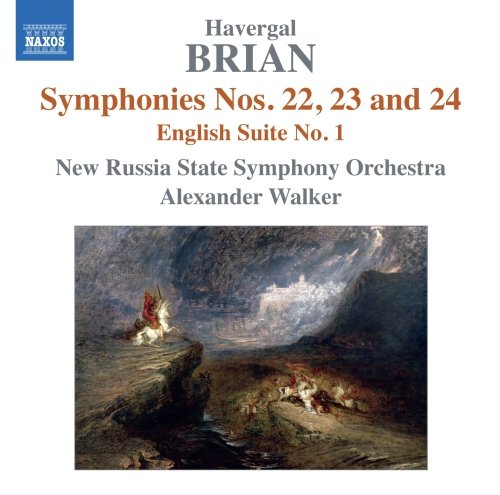BRIAN Symphonies
New Brian: three symphonies from Moscow and a potpourri from Glasgow
View record and artist detailsRecord and Artist Details
Composer or Director: Havergal Brian
Genre:
Orchestral
Label: Dutton Laboratories
Magazine Review Date: 07/2013
Media Format: CD or Download
Media Runtime: 65
Mastering:
DDD
Catalogue Number: CDLX7296

Tracks:
| Composition | Artist Credit |
|---|---|
| (The) Tinker's Wedding |
Havergal Brian, Composer
Havergal Brian, Composer Martyn Brabbins, Conductor Royal Scottish National Orchestra |
| English Suite No 4, ‘Kindergarten’ |
Havergal Brian, Composer
Havergal Brian, Composer Martyn Brabbins, Conductor Royal Scottish National Orchestra |
| Symphony No 13, 'Kindergarten' |
Havergal Brian, Composer
Havergal Brian, Composer Martyn Brabbins, Conductor Royal Scottish National Orchestra |
| Concerto for Violin and Orchestra |
Havergal Brian, Composer
Havergal Brian, Composer Lorraine McAslan, Violin Martyn Brabbins, Conductor Royal Scottish National Orchestra |
Composer or Director: Havergal Brian
Genre:
Orchestral
Label: Naxos
Magazine Review Date: 07/2013
Media Format: CD or Download
Media Runtime: 65
Mastering:
DDD
Catalogue Number: 8 572833

Tracks:
| Composition | Artist Credit |
|---|---|
| Symphony No 22, 'Symphonia Brevis' |
Havergal Brian, Composer
Alexander Walker, Conductor Havergal Brian, Composer New Russia State Symphony Orchestra |
| Symphony No 23 |
Havergal Brian, Composer
Alexander Walker, Conductor Havergal Brian, Composer New Russia State Symphony Orchestra |
| Symphony No 24 |
Havergal Brian, Composer
Alexander Walker, Conductor Havergal Brian, Composer New Russia State Symphony Orchestra |
| English Suite No. 1 |
Havergal Brian, Composer
Alexander Walker, Conductor Havergal Brian, Composer New Russia State Symphony Orchestra |
Author: Guy Rickards
Marat Bisengaliev and Lionel Friend recorded the Violin Concerto (1934-35) over 20 years ago, mightily impressing Michael Oliver on one of my favourite Brian discs with The Jolly Miller and Symphony No. 18. Dutton’s new version is a strong rival, McAslan as virtuoso and searching an executant, more Romantic in expression, with a beguiling delicacy of touch. Listen to the unearthly, muted lento episode in the finale to hear the difference between McAslan’s filigree and Bisengaliev’s steel. Dutton’s sound has more depth, warmer and much less clinical than Naxos’s.
Brian’s reputation rests on his symphonies and these discs premiere three and restore to the catalogue the shortest of them all, No 22. After excellent accounts of two of Brian’s finest single-span symphonies, Nos 10 and 30 (8/11), Brabbins compels again in one of the toughest and most elusive, No 13 (1959-60), its 16 epic minutes traversing a dark landscape taking in the tragic and the exuberant, alternating barely accompanied solos with the grandeur of a massive orchestra with quadruple woodwind. A score that repays familiarity, Brabbins reveals its lyricism and polyphonic subtlety.
In a way, the triptych of Symphonies Nos 22-24 (1964-65) is easier to assimilate for the collectively larger scale and motivic inter-relationships. No 22, the nine-minute Symphonia brevis (the least unfamiliar, having been recorded previously), sets the ground for the combative No 23, an altogether larger work, and the single-span No 24, which attains first victory, then celebration and finally serenity. Brian really did do single-movement symphonies very well.
Naxos’s sound is clear and precise, the playing of the New Russia State Symphony Orchestra remarkably idiomatic if understandably tentative occasionally. Their account of English Suite No 1 is unquestionably superior to the City of Hull Youth Symphony Orchestra’s and much better recorded. Both are highly recommended to anyone wishing to understand this still much-misunderstood composer.
Discover the world's largest classical music catalogue with Presto Music.

Gramophone Digital Club
- Digital Edition
- Digital Archive
- Reviews Database
- Full website access
From £8.75 / month
Subscribe
Gramophone Full Club
- Print Edition
- Digital Edition
- Digital Archive
- Reviews Database
- Full website access
From £11.00 / month
Subscribe
If you are a library, university or other organisation that would be interested in an institutional subscription to Gramophone please click here for further information.




